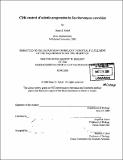CDK control of mitotic progression in Saccharomyces cerevisiae
Author(s)
Rahal, Rami S
DownloadFull printable version (41.64Mb)
Alternative title
Cyclin-dependent kinase control of mitotic progression in Saccharomyces cerevisiae
Other Contributors
Massachusetts Institute of Technology. Dept. of Biology.
Advisor
Angelika Amon.
Terms of use
Metadata
Show full item recordAbstract
Mitotic cyclin-dependent kinases (CDKs) are best known for their essential functions in triggering entry into M-phase, where they have established roles in nuclear envelope breakdown, chromosome condensation, and Golgi fragmentation. Whether mitotic CDKs have essential functions within mitosis is unclear. The work presented in this thesis indicates that mitotic CDKs, Clbl/2-CDKs or Clb2/3-CDKs, have two essential roles in mitotic progression. First, mitotic CDK activity was found to be required for the timely degradation of Securin/Pds1 at the metaphase-anaphase transition, demonstrating a requirement for mitotic CDKs in APC/C-Cdc20 activation in vivo. Second, mitotic CDK activity was necessary for the elongation of the mitotic spindle in anaphase. This requirement for mitotic CDKs is independent of cohesin removal and thus constitutes a novel role for CDK activity in mitotic progression. The dual roles of CDK in initiating loss of sister-chromatid cohesion and spindle elongation suggest a mechanism by which cells can couple and coordinate these events during mitosis. In addition, these results support a model in which different CDK activity threshold requirements help establish the order of events within in M phase, thereby ensuring cells initiate chromosome segregation only after they accumulate enough CDK activity to condense their chromosomes and to build a mitotic spindle.
Description
Thesis (Ph. D.)--Massachusetts Institute of Technology, Dept. of Biology, 2008. Includes bibliographical references.
Date issued
2008Department
Massachusetts Institute of Technology. Department of BiologyPublisher
Massachusetts Institute of Technology
Keywords
Biology.